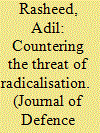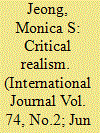| Srl | Item |
| 1 |
ID:
146972


|
|
|
|
|
| Summary/Abstract |
In recent years, rising instances of home-grown terrorism, lone-wolf operations and growing polarisation within societies have upstaged the global military struggle against major transnational terrorist organisations. As the dissemination of radical ideas and related violence increases, over 40 governments around the world have decided to develop their own counter-radicalisation and de-radicalisation programmes, in keeping with their socio-political and cultural particularities. This article studies some of the counter-radicalisation theories, policies and programmes developed by various countries in recent years with the aim of facilitating further research to develop a comprehensive counter-radicalisation policy in India.
|
|
|
|
|
|
|
|
|
|
|
|
|
|
|
|
| 2 |
ID:
167223


|
|
|
|
|
| Summary/Abstract |
The fundamental problem in middle power scholarship lies in the research design that inadvertently permits bias, tautology, and circularity in the process of realizing the final outcome. Most researchers begin with a presumption that middle powers are countries in the middle range of the world order, capable and willing to play some constructive roles beyond their borders. Thus, they tend to select methods and data compatible with the given presumption, and reach predictable outcomes that determine middle power status by middle power behaviours, or middle power behaviours by middle power status. This is an epistemic fallacy where the ontic category of middle powers is defined by the epistemic knowledge of middle powers. Eventually, any countries with comparable characteristics/behaviours to the given presumption can be classified as “middle powers” conducting middle power behaviours. This article offers critical realism as a much-needed remedy to the stagnant middle power scholarship. It examines a group of countries already categorized as middle powers—Mexico, Indonesia, South Korea, Turkey, and Australia (MIKTA)—under a critical realist framework, and finds that those countries and their activities cannot be generalized by the conventional middle power conception. In fact, the middle power rhetoric itself holds both a positive and negative ideological implication that requires further scrutiny. Yet, what makes the critical realist research design and its findings invaluable is the commitment to ontological realism, epistemological relativism, and judgmental rationalism that addresses the recurring epistemic fallacy. Therefore, the research findings are not merely new insights about “middle power” countries; they are a valid clue that can help uncover the “real” world that causes the so-called “middle power” categorization.
|
|
|
|
|
|
|
|
|
|
|
|
|
|
|
|